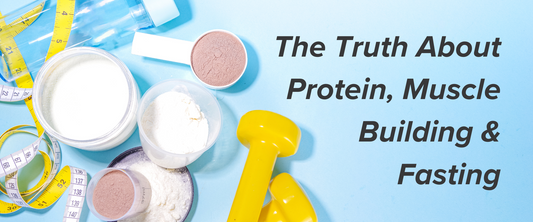In the realm of fitness and nutrition, a prevailing belief insists that consuming high amounts of protein is essential for building muscle. However, this notion oversimplifies how our bodies actually function. Contrary to popular belief, eating protein alone doesn’t build muscle—exercise does. Let’s delve into why this is the case and how fasting fits into the picture.
Firstly, the human body doesn’t store excess calories as muscle. When you eat, surplus calories are converted into glucose (stored as glycogen) or fat. Muscle isn’t a storage medium for excess calories. When you’re not eating, such as during fasting, your body taps into stored glycogen or fat for energy, not muscle. This physiological process underscores a critical point: muscle growth is driven by physical activity, not by how much protein you consume.
Muscle hypertrophy occurs as a response to exercise, particularly resistance training. When you lift heavy weights, your muscles experience stress and micro-tears. The recovery process following this stress leads to muscle growth and strengthening. Conversely, if you don’t engage in exercise, your muscles will atrophy. This principle is universally applicable and highlights that the act of building muscle is inherently linked to physical activity, not dietary intake alone.
Despite these facts, many people are tempted by claims that protein supplements and shakes are vital for muscle growth. These assertions are often driven by commercial interests rather than scientific evidence. The truth is, eating protein doesn’t directly build muscle. Instead, protein helps repair and build muscle tissue after exercise. Without the stimulus of exercise, extra protein won’t translate into increased muscle mass.
Fasting adds another layer to this discussion. Some studies have suggested that fasting might lead to muscle loss, but these studies often use indirect methods to measure muscle mass. For instance, body composition assessments like Bioelectrical Impedance Analysis (BIA) or Dual-Energy X-ray Absorptiometry (DEXA) can misinterpret changes in body water as changes in muscle mass. More direct measures of strength reveal a different story.
Recent research, including a study on long-term fasting, has shown that fasting doesn’t lead to muscle loss. In fact, participants in one study demonstrated improved muscle strength during and after fasting. This study utilised a fasting protocol combined with low-intensity exercise and found that while body weight and lean tissue decreased, muscle strength remained stable or even increased. This suggests that fasting, when combined with exercise, does not impair muscle strength as previously thought.
The key to muscle growth is consistent exercise rather than excessive protein intake. While protein plays a role in muscle repair, it’s the act of exercising that actually builds muscle. Fasting, contrary to some misconceptions, does not automatically result in muscle loss, especially when paired with appropriate exercise. Therefore, focus on maintaining a balanced diet, exercising regularly, and don’t be swayed by exaggerated claims about protein supplements. Your muscles will thank you.
























